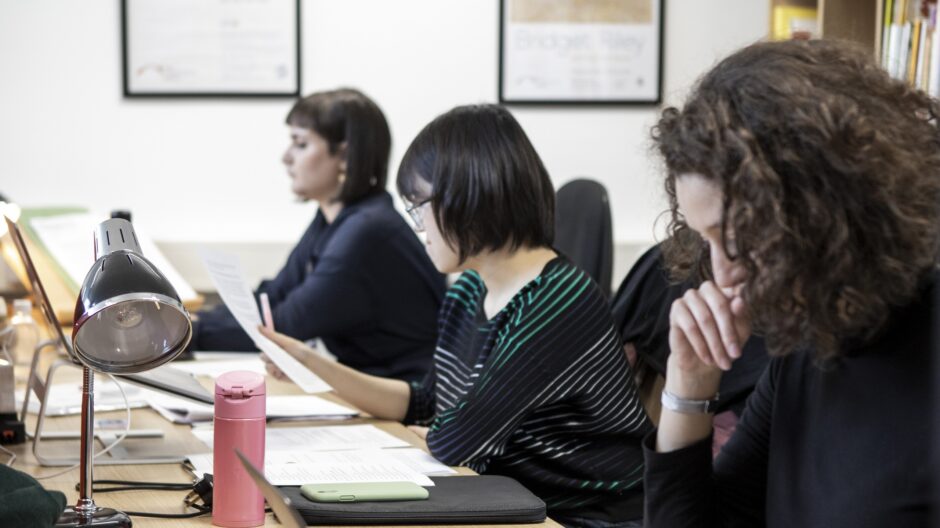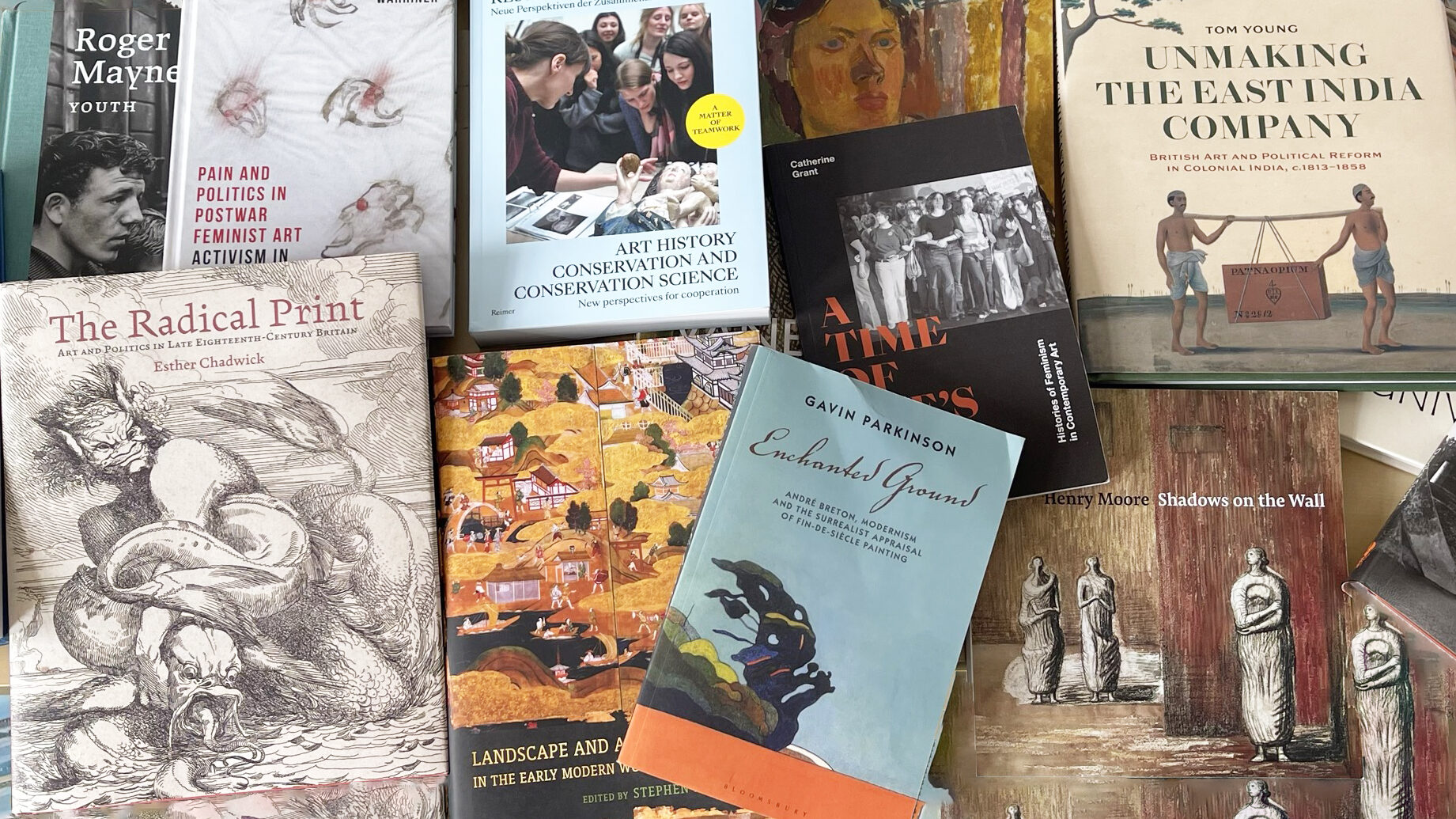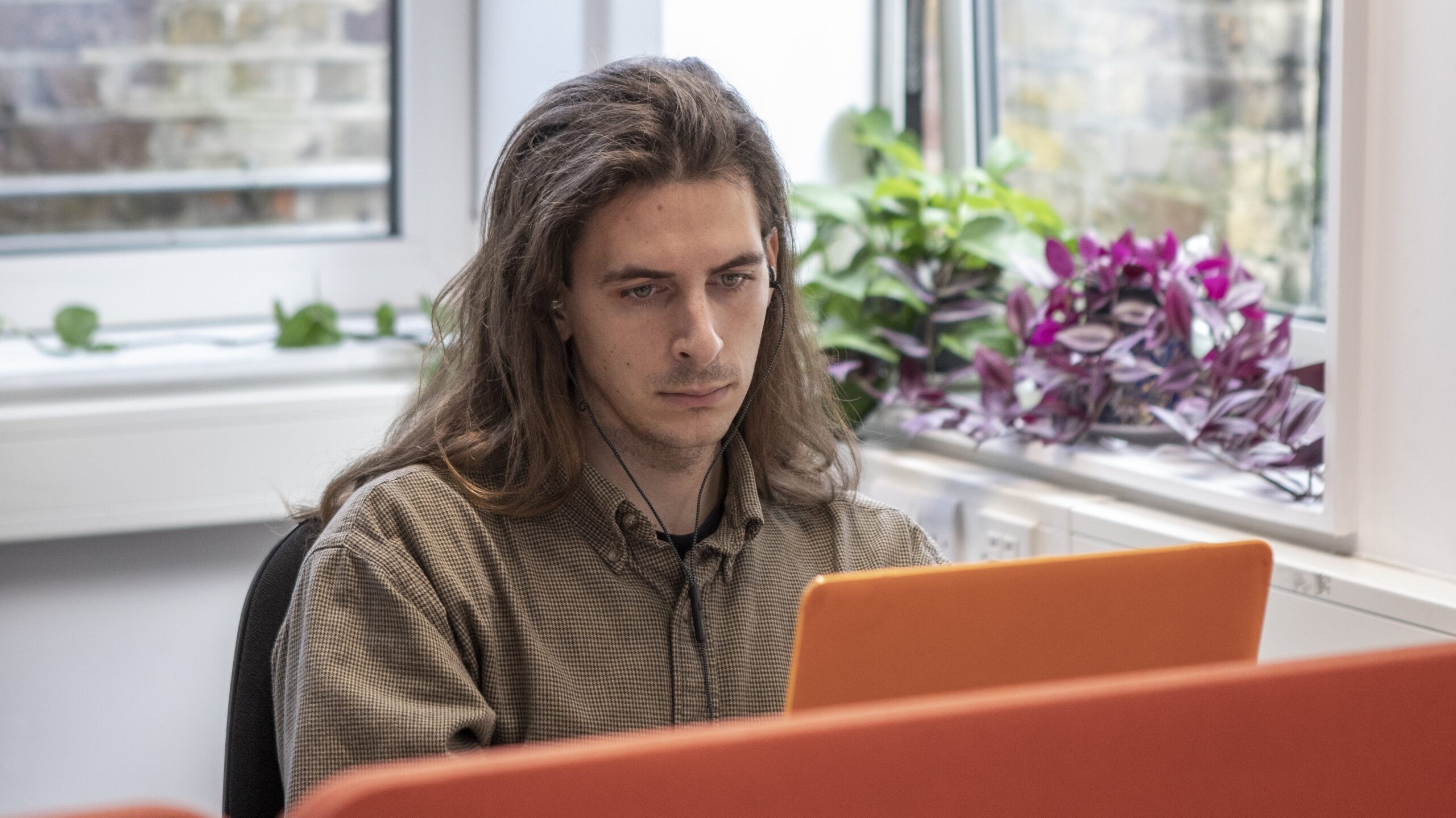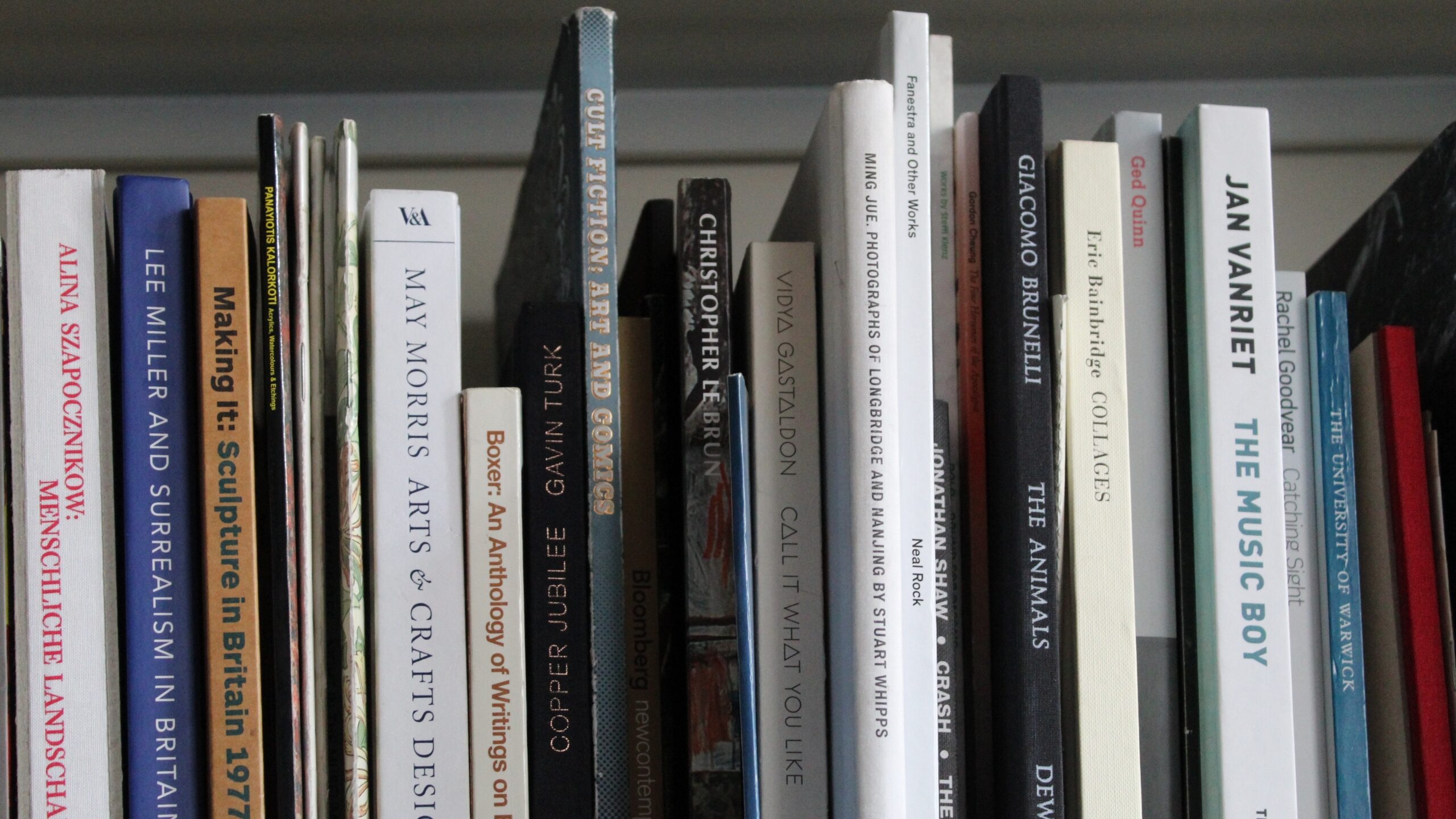Course Overview
Status
Applications for 2026 entry closed.
Location
Vernon Square Kings Cross, London, WC1X 9EP
Duration
3 years, full time or 6 years, part time
Awarding body
University of London
Intake
15 - 20 students per year
The PhD degree at the Courtauld Institute is an ambitious, rigorous, and internationally renowned programme with a global outlook and unparalleled strengths in art history, conservation and curating. It enables postgraduate researchers to redefine the boundaries of art history, conservation and curating by promoting innovative and interdisciplinary research.
At the Courtauld Institute you will join a diverse cohort of over 100 postgraduate researchers drawn from the UK and internationally to study a wide range of topics and approaches in an intellectually stimulating research-intensive environment.
You will benefit from the supervision of subject experts who work at the forefront of their respective fields. Members of faculty have extensive experience of advanced research including curating major exhibitions of historic and contemporary art, editing and publishing in leading academic journals, winning competitive research grants, speaking publicly in a great variety of institutions and events, and working in archives and collections worldwide. Learn more about our Faculty.
Alongside close supervisory guidance, you will benefit from researcher training, cohort and network-building activities, and professional development opportunities, designed to support you at all stages of your doctoral degree.
At the Courtauld Institute, you will become part of a vibrant intellectual community. A rich programme of research events hosted by the Research Forum will give you access to cutting-edge new research and ideas and the opportunity to build your academic network. Postgraduate researchers play an active role in inviting speakers, devising and convening research activity, and participating in events for academic and public audiences.
Postgraduate researchers are valuable members of our dynamic research clusters, which bring together specialist researchers from within and beyond the Courtauld to exchange and develop new knowledge and innovative ideas. Major research centres, including the Manton Centre for British Art and the Courtauld Centre for the Art of the Americas, represent world-leading concentrations of research expertise and new thinking. Our active research partnerships with a range of organisations across the cultural sector, including the National Trust and English Heritage, enable applied understanding of advanced research.
Courtauld postgraduate researchers develop a wide range of professional experience. They edit and produce the postgraduate journal Immediations and have opportunities to contribute curatorially in our gallery project space and prints and drawings room. Postgraduate researchers can also gain valuable teaching experience on our BA Art History degree and via our creative public programmes.
Structure
The PhD programme is structured to help you attain the required skills you need to undertake your research and write your PhD thesis. This allows you to maintain and build momentum in your writing and to complete your thesis within the three, or at maximum four-year time span allotted.
Year One seminars take place over the course of Autumn and Spring terms. Your cohort will come together on a weekly basis to explore theoretical and practical methods and approaches to research through readings, presentations, and discussions.
Alongside seminars, you will also attend the skills course, a series of sessions that provide guidance on aspects of the PhD course and training with skills such as referencing programmes, image management and photography, using social media in your research, presenting at conferences, teaching, publishing, and archival research. During the first year you may also take language classes, either at the Courtauld Institute or through neighbouring institutions such as LSE, SOAS, Kings, and the Geothe Institute.
Important courses take place within the University of London, including about historical skills and archives, palaeography, public speaking, and oral histories. Sessions held by ReSkIN, an organisation of the visual arts community across the University of London, are another important component of the first year programme, providing information about writing and research on the visual arts and the opportunity to meet local scholars working on topics in the visual arts.
In the third term of the first year you will submit your first year monitoring paper. This consists of a chapter of your research, an outline of your thesis, and plan for the next two years of work; it will be read by your supervisory team and discussed at a formal meeting with them in early June. You have to pass this monitoring exercise to proceed to the following year. It is an important milestone in your PhD research, and the focus for your research and writing in the first year.
Year Two often includes extended research or field work trips abroad. Training in languages or other skills may continue, and students may also be involved with working as teaching assistants and other opportunities for building professional experience. You will continue to meet regularly with your supervisory team. There is a further monitoring event during the second year that may take a variety of forms, but most often involves some sort of presentation of your research to faculty and research students.
Year Three will focus on completing and revising your chapters: this can be the most intense year for writing. You will meet with your supervisory team regularly and will also be required to take part in the Third Year Postgraduate Symposium attended by MA and PhD students and faculty from across the Institute.
Entry Requirements and application
Academic Requirements: PhD applicants are expected to have achieved a Master’s degree in a subject relevant to their proposed research. Those with Master’s degrees awarded in the UK are normally expected to have received at least 65% overall, with at least 70% in the dissertation or thesis.
English Language Requirements: If your first language is not English, we require proof of English language proficiency. Please see the English Language Requirements page.
Procedure
PRE-APPLICATION
First, applicants must identify a potential supervisor at the Institute who is an expert in the relevant field. A list of current Courtauld staff can be found on our Faculty pages.
Before you can submit a full PhD programme application, you must send a Pre-Application and your CV to pgadmissions@courtauld.ac.uk
The pre-application enables important consultation with your prospective supervisor before proceeding to the full application, and also confirms the availability of the supervisor, as there are strict limits on how many PhD students any one supervisor may take in a given year.
A Pre-Application will consist of the following:
- Research Title
- Name of Proposed Supervisor(s)
- Research Proposal Summary of 300 words setting out the substance of the proposal
We will assess your pre-application and discuss your proposal with your preferred supervisor before providing feedback. Your pre-application will provide the foundation for further discussions with your preferred supervisor or, should that individual be unavailable for supervision or deemed not an ideal fit, for introduction to other potential supervisors. Please do not send more than one pre-application proposal.
We will be accepting pre-application proposals for the 2026/27 academic year from 1 September 2025 onward.
Following the submission of your application, your proposed supervisor will contact you to schedule an interview with members of Faculty.
Pre-application Deadline: 17 November 2025
FULL PROGRAMME APPLICATION
Once you are invited to submit a Full Programme Application, you will be provided with a link to the main Programme Application Portal.
Full Programme Application Deadline: 8 January 2026
Please note that students requiring a student route visa to study in the UK are not permitted to study part-time.
Fees and Funding
Information about tuition fees can be found here. Fees are subject to change each academic year.
Financial support for your studies:
Alumni Loyalty Scheme: This scheme is open to any graduate of the Courtauld Institute of Art admitted to a postgraduate programme of study. Recipients will receive a 10% loyalty discount off their tuition fee for the duration of the course.
Scholarships: The Courtauld Institute is pleased to offer a number of Research Scholarships which vary in amount and qualifying criteria. Applications are welcomed from Home, EU and Overseas applicants and students.
Collaborative Doctoral Awards: The Courtauld Institute are delighted to occasionally offer Collaborative Doctoral Awards. These are specific, one-off projects proposed by a Courtauld-based academic to work in collaboration with an organisation outside of higher education. We typically offer one Collaborative Doctoral Award each year – details will normally be published in April/May. Please check periodically for new award announcements.
Previous awards have included:
- Imperial Intimacies: Portraiture and the East India Company 1757-1857 – AHRC Collaborative Doctoral Award (with Tate)
- New Media Art Histories in Asia – AHRC Collaborative Doctoral Award
- Global Surrealism: Tracing International Networks – AHRC Collaborative Doctoral Award
- Net Art East: Post-Socialist Networks and New Media – AHRC Collaborative Doctoral Award
Associated programme costs: See General Associated Programme Costs. Depending on their research project, postgraduate researchers may have to plan extended research trips. If postgraduate researchers are not in receipt of a scholarship that includes travel costs, these will be self-funded, however, the Courtauld can offer small travel grants and other sources of funding may become available, including UKRI funding. These are announced year-on-year by the Research Manager.
Careers and Employment
Many doctoral students aspire to advanced careers in the arts or academia, including roles in universities, museums, galleries, and non-profit organisations. Your supervisor and advisor will play an important role in counselling you around professionalisation and preparation for your future career. The PhD programme hosts a variety of other forums for career planning, discussions that begin in the first-year skills and methods seminar and continue throughout your time at the Courtauld Institute.
Should you decide to pursue a career in a field outside those traditionally targeted by PhDs, you will find your degree has equipped you with superior and highly transferable skills including research, analysis, project design and management, and writing.
The Courtauld Careers Service offers bespoke, one-on-one advice and support for exploring career options, enhancing employability, understanding and navigating the jobs and self-employment market, and making successful applications. This service is available for all graduates for up to two years after graduation.
Support
To support you during your degree, we offer:
Wellbeing: We have a dedicated Wellbeing team, including counsellors and advisors, available to provide you support in your health and wellbeing.
Academic skills: In addition to the PhD skills and methods seminar offered to all doctoral students in their first year, the academic skills tutor offers group and one-to-one help further develop your research skills. We also have two Royal Literary Fund fellows who will help you with your writing skills, concentrating on how to structure your writing and improve your written expression.
Supervisor and Advisor: Your supervision team consists of both your primary supervisor and an advisor selected in consultation with your supervisor to provide complementary advice and support on research and writing. Structured and ad hoc supervision sessions provide you with ongoing feedback and support as you develop your research.
Meet our students and alumni
Meet our students
Ambra, Translating Collectivity: Surrealism of the Levant
The Courtauld PhD Programme has given me generous means to develop my professional and personal life. The full programme of Skills and Methodology seminars in Year 1 prepared me for the different stages of PhD life and allowed me to discuss in a collective manner the key theoretical frameworks and objects of my thesis, helping me make important strides in my research. The method is rigorously theoretical, as well as encouraging of an object-based approach through active and critical close looking. Through these seminars I formed meaningful connections with my peers. The PhD Study Room at the Courtauld also allows for a dedicated study space where PhD students can work, discuss ideas or kick back after a long day.
Outside of the Courtauld, the potential for independent study and research within the city is large, and students can choose where to spend their time. Nevertheless, the Institute fosters a dynamic and exciting community, with which I sought to become more involved. I attended the rich programme of lectures and conferences at the Research Forum, as well as the smaller seminars and symposia that take place on a weekly basis. I organised and convened a seminar for two years, Conversations Across Time, with the intention of bringing together research students across periods to discuss and grow their research through informal feedback. I was a PhD Representative for the Student Union for two years: getting involved with the SU is a precious way to get involved with the administrative side of the Institute and engage with the student body in meaningful ways. Finally, I delivered seminars on a Teaching Assistant post; while this is not a compulsory part of the PhD programme, it is a valuable experience which enriched my professional life and my research.
Lan, Connections in the Making and Meaning of the Art of Bhutan and Tibet in the 17th and 18th Centuries: a Study of the Wall Paintings at Tango Monastery
I joined the Courtauld Institute in 2013 as an MA student of the Conservation of Wall Painting Department. The teaching staff were dedicated in their task of training us – the next generation of wall painting conservators. The outlook was fundamentally international with an emphasis on being at the cutting edge of conservation practice. The course was intense; days filled with lectures, site visits, and practical work and evenings for preparation and assignments. Teaching took advantage of the large professional networks associated with the department, allowing us to benefit from the first-hand experience of expert practitioners and researchers.
My cohort had seven women that came from different parts of the world with diverse academic backgrounds. We spent three years together in the lab, studio, and on-site, sharing accommodation during fieldwork and discussing wall paintings all the time. These shared experiences and interests naturally form the basis of friendships as well as a long-lasting network of colleagues.
One of the most precious and unique aspects of being at the Courtauld was the opportunity to do hands-on work during fieldwork campaigns every year. In fieldwork campaigns students function as full-team members rather than interns, sharing responsibility for planning and managing the programme of work. Crucially, we participate in discussion and decision-making with supervisors helping us to develop a critical approach to conservation. Each fieldwork experience was different but importantly they all involved an intimate engagement with the site and an expansion of my understanding of the roles and responsibilities of a conservator.
My primary academic interest has been always in Himalayan wall paintings. It was grateful to find a research topic that I really passionate about during my MA dissertation, and with support from professors and foundation I was able to continue the research as a PhD student. This research was structured to complement and support conservation projects within the department. Since then, I have been fortunate to dedicate my study to this subject that I love. My internal and external supervisors have kindly provided support throughout the time, as well as other senior colleagues in the broader Courtauld network. The environment here in the department was truly like a family where we learned from, and supported, each other.
Natasha, The Masculine Image in Qajar Iran (1789 – 1925)
I guess you could say I have enjoyed my time at the Courtauld, given that I’m still here nearly ten years after starting my BA! When I attended my undergraduate interview all those years ago, the student ambassador was posed with a question by a very eager parent: “what do you do after the undergraduate programme?” “Well,” came the answer, “if you’re lucky, you go on to do an MA, and if you’re even luckier you go on to do a PhD!”. Little did I know that, as luck would have it, that ended up being my trajectory as I waited nervously in a corridor. I can’t say I felt like the ‘typical’ Courtauld candidate – I was from a low income background, was state school educated and with no prior qualification in the subject apart from a love for art – even the grandiosity of the spiral staircase of the Somerset House campus alone made me think twice if this was the place for ‘people like me’, despite having fallen in love with the prospect of studying here. However, my fears were quickly allayed as, a little while later, the Courtauld became my academic home for the foreseeable future.
A Courtauld education, be it undergraduate or postgraduate study, is an exercise in saturation – be prepared to live and breathe art and investigate every foreseeable corner of the discipline. A rigorous and pioneering global approach to is given to both theoretical and material study; something which is highlighted by the component of methodology discussion seminars with the cohort during the first year as part of the PhD programme, which are taken alongside your own independent area of research. As a result, what can often be a lonely road of doctorate study can often result in a close-knit student body. World class supervision is also complimented by regular opportunities to present and publish your research, such as seminar groups for each subject area, yearly conferences and the Immediations journal. My own research was also supported by the ARHC CHASE consortium for the humanities, which as well as providing essential financial support also encouraged inter-disciplinary interaction with peers within other disciplines at participating institutions.
Meet our alumni
Adele Tan (MA 2003, PhD 2009), Senior Curator, National Gallery Singapore
After studying English Literature at the National University of Singapore, Adele completed both her MA and PhD at the Courtauld.
As a curator, Adele’s research focuses on contemporary Southeast Asian and Chinese art, with a special interest in performative practices, photography, and new media. Some of her major exhibitions include Yayoi Kusama: Life is the Heart of a Rainbow (2017) and Awakenings: Art in Society in Asia 1960s-1990s.
Before joining the National Gallery Singapore, she was assistant editor at the British Journal Third Text and her articles have appeared in numerous other scholarly publications, exhibition catalogues and journals such as PAJ, Broadsheet, Yishu and Eyeline. Adele was part of the curatorial panel for the 4th Singapore International Photography Festival and is a member of the International Association of Art Critics.
In addition to her curatorial role, Adele also lectures at the National University of Singapore.
Jack Hartnell (BA 2008, MA 2009, PhD 2014), Art History Lecturer, University of East Anglia, Norwich
Jack received his PhD in 2014, after which he held fellowships at the Victoria and Albert Museum in London, Columbia University in New York and the Max-Planck-Institut für Wissenschaftsgeschite in Berlin, as well as a position as the Andrew W. Mellon Foundation Postdoctoral Fellow at the Courtauld. He joined the UEA faculty in 2017.
Jack’s research and teaching focuses on the visual culture of late medieval and early renaissance medicine, cartography, and mathematics. His most recent book, Medieval Bodies: Life, Death and Art in the Middle Ages, was the Sunday Times History Book of the Year in 2018.
Jack was also heavily involved in launching Courtauld Books Online – an important academic resource where users can find high-quality, peer-reviewed art history monographs, available to read online for free.
Nancy Ireson (PhD 2005), Deputy Director for Collections and Exhibitions, Barnes Foundation, Philadelphia
Nancy Ireson completed her BA, MA and PhD at the Courtauld, finishing her PhD in 2005 with a thesis on Making Images: The Work and Early Critical Reception of Henri Rousseau. After her time at the Courtauld she took up positions at some of the world’s leading art institutions, including Tate Modern, The National Gallery, the Courtauld, the Leverhulme Trust and the Victoria and Albert Museum in London, as well as the Art Institute of Chicago and the Morgan Library and Museum in New York.
At Tate Modern, where Nancy was Curator of International Art between 2015 and 2018, she curated several blockbuster exhibitions, including the world-famous Picasso 1932: Love, Fame, Tragedy exhibition (2018) and the memorable Modigliani exhibition (2017-2018).
Nicholas Cullinan (BA 2002, MA 2003, PhD 2010), Director, National Portrait Gallery, London
Nicholas Cullinan is an art historian, curator and current Director of the National Portrait Gallery, London. He completed his BA, MA and PhD at the Courtauld and his PhD thesis, The Archeology of Knowledge: Excavating Arte Povera, was supervised by Professor Sarah Wilson. During his student days Nicholas worked as a visitor services assistant at the National Portrait Gallery, little knowing that he would later become its director, aged just 37. Nicholas has been responsible for leading a £35.5m transformation of the gallery, with the aim of making it “more relevant, more open and more accessible.”
Prior to taking the helm at the National Portrait Gallery, Nicholas worked in some of the most prestigious museums and galleries in the world, including the Guggenheim museums in Bilbao, New York and Venice, and curatorial roles at Tate Modern and The Metropolitan Museum of Art in New York.
During the course of his career Nicholas has curated highly acclaimed exhibitions, including Henri Matisse: The Cut-Outs at Tate Modern, which was one of the most successful exhibitions in the gallery’s history.









